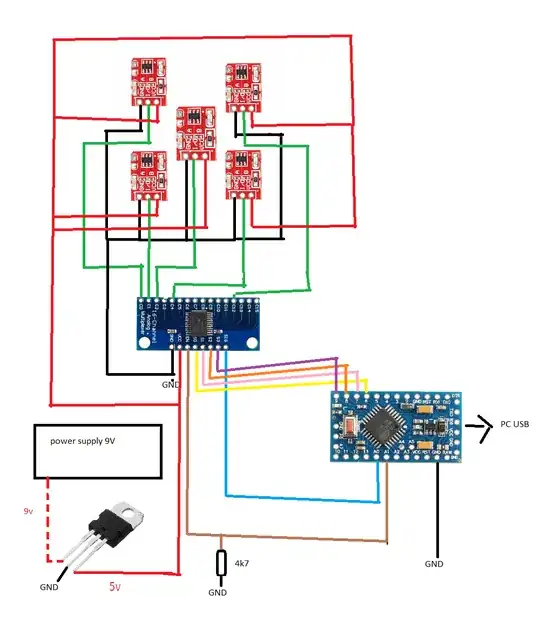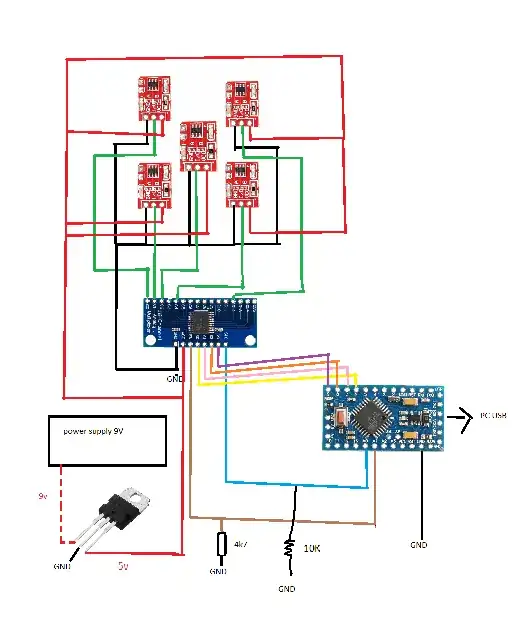I am working on a project that needs multiple digital signals and I am considering the CD74HC4067 (on a break-board) to work as a multiplexer. More specifically i am trying to build a keypad with multiple ttp123 break-boards. Each ttp123 signal is connected to one of the 0-15 pins of the CD74HC4067. The S0-S3 pins are connected to digital Pins D6 to D9 on a pro mini. Signal is on A0 and EN is on A1. A1 and EN have a 4K7 resistor to ground. I power the setup with a separate 5v and the arduino is connected on a pc usb port.
I expect when a ttp123 is pressed to trigger a HIGH and this event to be passed to SIG pin. Here is my code:
//Using CD74HC4067 16-Channel Analog Multiplexer
//Mux control pins
int s0 = 6;
int s1 = 7;
int s2 = 8;
int s3 = 9;
//Mux in "SIG" pin
int SIG_pin = A0;
int EN_pin = A1;
void setup(){
pinMode(s0, OUTPUT);
pinMode(s1, OUTPUT);
pinMode(s2, OUTPUT);
pinMode(s3, OUTPUT);
pinMode(EN_pin, OUTPUT);
digitalWrite(s0, LOW);
digitalWrite(s1, LOW);
digitalWrite(s2, LOW);
digitalWrite(s3, LOW);
digitalWrite(EN_pin, LOW);
Serial.begin(9600);
Serial.println("keypad interfacing_CD74HC4067 starting...");
}
void loop(){
String a;
//digitalWrite(EN_pin, HIGH);
Serial.println(" press any key to continue ...");
//digitalWrite(EN_pin, LOW);
while (!Serial.available());
while(Serial.available()) {
//Loop through and read all 16 values
for(int i = 0; i < 16; i ++){
//Serial.print("Value at channel ");
//Serial.print(i);
//Serial.print("is : ");
//Serial.println(readMux(i));
float volts = readMux(i);
Serial.print("Value at channel ");
Serial.print(i);
Serial.print(" is : ");
Serial.print(volts);
Serial.println();
//delay(1000);
}
a= Serial.readString();// read the incoming data as string
}
}
float readMux(int channel){
int controlPin[] = {s0, s1, s2, s3};
int muxChannel[16][4]={
{0,0,0,0}, //channel 0
{1,0,0,0}, //channel 1
{0,1,0,0}, //channel 2
{1,1,0,0}, //channel 3
{0,0,1,0}, //channel 4
{1,0,1,0}, //channel 5
{0,1,1,0}, //channel 6
{1,1,1,0}, //channel 7
{0,0,0,1}, //channel 8
{1,0,0,1}, //channel 9
{0,1,0,1}, //channel 10
{1,1,0,1}, //channel 11
{0,0,1,1}, //channel 12
{1,0,1,1}, //channel 13
{0,1,1,1}, //channel 14
{1,1,1,1} //channel 15
};
//loop through the 4 sig
for(int j = 0; j < 4; j ++){
digitalWrite(controlPin[j], muxChannel[channel][j]);
}
//read the value at the SIG pin
int val = analogRead(SIG_pin);
//return the value
float voltage = (val * 5) / 1024.0;
return voltage;
}
Just for simplicity, I have connected only one ttp123 on the system, ttp123 signal to channel12 on 74HC4067. With ttp123 touched, I would expect to get a high on SIG when I write {0,0,1,1}, to S0-S3. All other channels should be LOW. However here is what I get:
On my first run after a boot:
press any key to continue ...
Value at channel 0 is : 2.53
Value at channel 1 is : 2.58
Value at channel 2 is : 2.53
Value at channel 3 is : 2.60
Value at channel 4 is : 2.51
Value at channel 5 is : 2.55
Value at channel 6 is : 2.50
Value at channel 7 is : 2.52
Value at channel 8 is : 2.42
Value at channel 9 is : 2.47
Value at channel 10 is : 2.43
Value at channel 11 is : 2.50
Value at channel 12 is : 2.40
Value at channel 13 is : 2.43
Value at channel 14 is : 2.38
Value at channel 15 is : 2.44
and then after each sample run all channels seem to get lower values...
press any key to continue ...
Value at channel 0 is : 1.70
Value at channel 1 is : 1.76
Value at channel 2 is : 1.71
Value at channel 3 is : 1.78
Value at channel 4 is : 1.70
Value at channel 5 is : 1.76
Value at channel 6 is : 1.72
Value at channel 7 is : 1.77
Value at channel 8 is : 1.67
Value at channel 9 is : 1.72
Value at channel 10 is : 1.69
Value at channel 11 is : 1.76
Value at channel 12 is : 1.69
Value at channel 13 is : 1.73
Value at channel 14 is : 1.67
Value at channel 15 is : 1.74
and I get no HIGH on channel 12 as I should.
Is there a need for a pullup or pulldown resistors in this setup? Should I connect a resistor to each S0-S3 with ground? Why is this not working?
When the system is resting I measure 4.93V at the ttp's Vs to GND and 0V TTP_SIGNAL to GND. When ttp's are touched TTP_SIGNAL to GND i measure a 3.94-3.88v. But the strange thing is that when i touch the ttp's I measure 2.xx Volts at all the mux channels. I think that there must be some kind of short circuit somewhere but it is not visible. The problem is that I can't test another CD74HC4067 since i have only one right now. Unless there is another suggestion I will look for a couple of these (CD74HC4067) as soon as possible.
Edit2:
I got hold of a new CD74HC4067 and connected just one capacitive touch pad. When nothing is touched/pressed, i get the following:
press any key to continue ...
Value at channel 0 is : 1.01
Value at channel 1 is : 0.90
Value at channel 2 is : 0.81
Value at channel 3 is : 0.62
Value at channel 4 is : 0.44
Value at channel 5 is : 0.42
Value at channel 6 is : 0.43
Value at channel 7 is : 0.43
Value at channel 8 is : 0.31
Value at channel 9 is : 0.28
Value at channel 10 is : 0.24
Value at channel 11 is : 0.18
Value at channel 12 is : 0.15
Value at channel 13 is : 0.23
Value at channel 14 is : 0.22
Value at channel 15 is : 0.13
When i touch the pad (connected to c0) i get:
press any key to continue ...
Value at channel 0 is : 4.15
Value at channel 1 is : 3.74
Value at channel 2 is : 3.75
Value at channel 3 is : 3.54
Value at channel 4 is : 3.76
Value at channel 5 is : 3.33
Value at channel 6 is : 2.88
Value at channel 7 is : 2.64
Value at channel 8 is : 3.77
Value at channel 9 is : 3.52
Value at channel 10 is : 3.07
Value at channel 11 is : 2.76
Value at channel 12 is : 2.04
Value at channel 13 is : 1.83
Value at channel 14 is : 1.67
Value at channel 15 is : 1.51
I measure volts between signal and ground at the capacitive touch pad, when touched i get 3.9v

